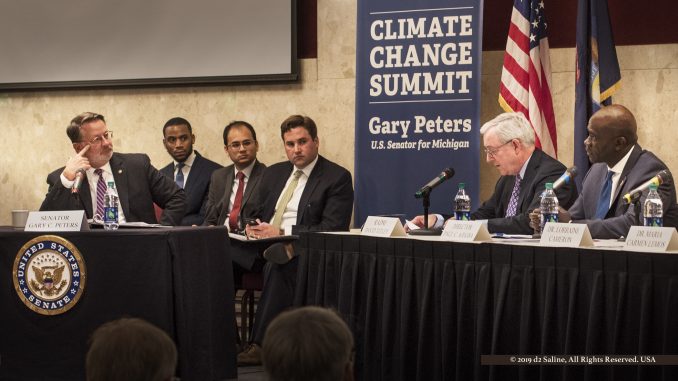
The first “Earth Day” is generally recognized in the United States as having been organized in response public concerns that had reached a tipping point in the wake of specific, highly visible environmental assaults during the closing year of the 1960s. These ranged from industrial contamination of waters off Lake Erie to unbridled whale hunting to near extinction. [1]
That recognition is credited to Democratic Senator Gaylord Nelson of Wisconsin and dates to April 22, 1970. Internationally, it is credited to a Christian publisher in California named John McConnell, who rather chose the vernal equinox one month earlier that same year as his marker. Anyone keep track of where that fell on the calendar during 2019? [2-5]
By way of perspective, the US Environmental Protection Agency (EPA) would have readers know that its own formation would not happen until December 2, 1970, at the initiative of President Richard M Nixon. [6-8]
It may be hard to imagine that before 1970, a factory could spew black clouds of toxic smoke into the air or dump tons of toxic waste into a nearby stream, and that was perfectly legal. They could not be taken to court to stop it.
How was that possible? Because there was no EPA, no Clean Air Act, no Clean Water Act. There were no legal or regulatory mechanisms to protect our environment. [9,10]
Today, our own United States Senator Gary Peters was in Lansing Michigan to host a summit very much in keeping with this day as the forty-ninth anniversary of Earth Day. Titled “The Cost of Inaction: The Impacts of Climate Change and the Financial Burden on Taxpayers,” this featured a five-person panel before a capacity audience in the ballroom of the Michigan State University Student Union building. Saline Journal was there to cover it in-person. [11-14]
After departing from prepared text to wish all in attendance a “happy Earth Day” and underscore the importance of discussion to follow, Senator Peters positioned panel members’ contributions matter-of-factly.
It is an undeniable fact that climate change — caused in large part by human activity — is a serious threat to Michigan, our Great lakes, our country, and our planet. Climate change not only threatens the natural resources that we all depend on, it threatens our infrastructure, health, economy, and even our national security.
Obviously mindful of summit positioning, he emphasized the importance of making what he argued are necessary near-term expenditures in order to avoid inevitable more costly expenses associated with addressing future consequences of neglect. Emotion aside, this is a straightforward matter of return on investment.
Panelists then built on this theme from the vantage points of their own specialties.
Retired Rear Admiral David W Titley of the US Navy confessed his own initial skepticism about so-called “climate change.” He subsequently undertook a study of its quantifiable impact on military bases — and thus as a matter of national security, our ability to assure soldiers’ combat readiness. That work lead to his current position of environmental leadership on those matters at Penn State. [15,16]
At the other end of the spectrum, Dr Lorraine Cameron with the University of Michigan Department of Health and Human Services works to identify ways that the impact of “what is” can be mitigated.
Assertions of “undeniable fact” notwithstanding, Senator Gary Peters himself called out strong disagreement with his position on climate change as reflected in budget priorities and positions taken on environmental matters by the Trump Administration. That said, there is no question that attention to the issues associated with Earth Day is today is fifty times greater than that which was attracted in 1970. [19]
Senator Peters very effectively leveraged this during his time at MSU today.
References
- “When Was the First Earth Day?” National Oceanic and Atmospheric Administration, US Department of Commerce.
- “Nelson, Gaylord Anton (1916-2005)” Biographical Directory of the United States Congress.
- “Vagabond youth led Earth Day founder John McConnell to life of peace” Megan Mitchell (October 27, 2012) The Denver Post.
- “The History of Earth Day” Larry West (April 4, 2019) Thought Co.
- “Vernal equinox” Encyclopaedia Britannica.
- “EPA History” United States Environmental Protection Agency (EPA).
- “The Origins of EPA” EPA.
- “37. Richard M Nixon” The White House.
- “Evolution of the Clean Air Act” EPA.
- “History of the Clean Water Act” EPA.
- Gary Peters: United States Senator for Michigan (home page).
- “Opening Statement: The Cost of Inaction: The Impacts of Climate Change and the Financial Burden on Taxpayers” Senator Gary C Peters (April 22, 2019) US Senate Committee on Homeland Security and Governmental Affairs.
- Senate Homeland Security and Government Affairs Committee – Democrats (Facebook Page).
- The Cost of Inaction: Failure to Address Financial Costs of Climate Change Will Hurt Taxpayers, US Senator Gary Peters, Ranking Member (2019) United States Senate Committee on Homeland Security & Governmental Affairs.
- “Center for Solutions to Weather & Climate Risk” Pennsylvania State University.
- “It’s Getting Harder to Define Military Readiness. Here’s What to Do About It” Colin P Clarke and Chad C Serena (July 12, 2016) Defense One.
- “Michigan Climate and Health Adaptation Program (MICHAP)” Lorraine Cameron MPH, PhD and Aaron Ferguson MPA, Michigan Department of Health & Human Services.
- Michigan Department of Health & Human Services (home page).
- “Earth Day: Facts & History” Alina Bradford (April 18, 2017) Live Science.



